Trumpism Stock Market and the crisis in American social equality
Stock-Markets / Stock Markets 2020 Jan 13, 2020 - 06:08 AM GMTI recently read that the richest 100 people in the world own more than the poorest 4 billion. This article also pointed out that the purchasing power of the average American worker has significantly diminished over the last number of decades. Case in point; in order to simply keep pace with official inflation data, using 1980 as a benchmark year, the average entry level wage in the States should be in the region of 16 dollars an hour not the current $10.00 (approx). This is not surprising, technology and the diminished power of unionised labour are exposing one of the major weaknesses of liberal capitalism: the concentration of wealth. I believe that unless this issue is resolved, particularly in the United States of America, within the next decade, we possibly could see the steady demise of all liberal institutions and a slide towards hard socialism.
The one economist who identified this fatal flaw in orthodox liberal economic theory was Maynard Keynes. He recognised that society was a social organism and unless harmony was maintained the breakdown in the social contract between the haves and haves-nots would sunder everything. He recognised the fragility of it all that was his genius. He identified that the solution to the concentration of wealth was a strong and enlightened government that understood money. To counter the inevitable concentration of wealth that capitalism promoted Keynes understood the need for the active redistribution of capital. He tried his best all his life to educate the political elite that money should not be regarded as wealth but simply as a medium of exchange. He pointed out that there was no value in a factory churning out product, if folk did not have the money to purchase what was produced. He recognised that consumption was the essence of production, not production per se. He therefore advocated high taxation on those who were rich in order to transfer purchasing opportunity to those who were poor. These transfers he believed should take the form of government supported jobs, subsidized industries, socially supported infrastructural development and welfare for those who were sick, old or infirm. These policies were actually adopted by F. D. Roosevelt through his “New Deal” to successfully end the great depression.
As Stephen Yearwood pointed out in his well received 2013 article:
“In Keynes’s analysis, to prevent depressions it would be necessary to prevent speculative bubbles. To prevent speculative bubbles, it would be necessary to prevent too much money from accumulating in the hands of too few people. To prevent that from happening, it would be necessary to have high marginal tax rates on high incomes.
Government would act as a pump, collecting taxes and returning that money to the private sector via expenditures.
Though Adam Smith was “against” taxes and Keynes was “for” them, both men had the same goal in mind: to keep the money circulating, sustaining a high level of economic activity and general prosperity.
Prior to capitalism, money circulated among very few people. In the pre-Great Depression economy, the principal beneficiaries of big businesses were big corporations. Today, nothing has changed. It is commonly estimated that the Fortune 500 companies are holding well over $1 trillion in cash (and $18 trillion is being held off-shore by wealthy individuals).
Like the mercantilist system it superseded, the capitalist economy has exhibited a tendency to serve the material interests of a relatively few people extremely well. Likewise, it has promoted the accumulation of money in large, unproductive pools.
Ultimately, the well-being of even the wealthiest people is tied to the performance of the system. The performance of the system is maximized when money is kept circulating — the fundamental economic insight shared by Smith and Keynes”.
For a long time the philosophies of FDR and Keynes have been out of date. However, the economic policies of President Trump have exasperated many Americans and rekindled among them an awareness of the need for a more enlightened redistribution of American wealth. They have recognised that in addition to the contraction in workers buying power, American bridges are falling apart, airports are out-dated, roads unmaintained and rail roads are becoming obsolete. What America is crying out for is a 2 – 3 trillion dollar infrastructure plan but Congress refuses to address this problem due to a budgetary and political crisis. This crisis in part has arisen due to President Trump introducing economic policies that have favoured the very rich. For example, he dropped corporation taxes from 35% to 21%, and granted a huge tax amnesty to corporations holding profits abroad. To highlight just one case; Apple Corp. took advantage of this tax amnesty signed into law in December 2017. The provisions allowed for a one-time repatriation of corporate cash held abroad at a lower tax rate than what would have been paid under the previous tax plan. Apple, which had 94 percent of its total cash of $269 billion outside the United States, made a one-time tax payment of $38 billion on the repatriated cash, amounting to an actual corporate tax rate of a mere 14%. Thus billionaires are gaining more billions while investment policies that could transform American infrastructure and create good American jobs have been still-born by a misconceived economic favouritism.
The end result of this short sightedness is fuelling the growth of socialism in the land of the free and, given the above, one can hardly be surprised. Hence the surge in popularity for left-leaning Democrat Elizabeth Warren. Her policies include: punitive corporate taxes, maximum taxes on high corporate pay, crushing inheritance taxes, the breaking up of Google, Facebook, Amazon, Apple et al, the introduction of a licencing administration whereby all corporations must adhere to socially benevolent policies, (making directors personally accountable), the nationalization of health care and the mandated appointment of workers to corporate boards. These policies amount to the biggest shake-up of American business since FDR’s New Deal. It would have been inconceivable for a Democratic presidential candidate to be so popular on such extreme policies a generation ago. This is an indication of just how fragmented, unfair and unstable the American social and economic order has become.
It is my contention that unless President Trump and the Republicans in Congress realise and respond successfully to the anger residing in the general American populace the liberal economic agenda could be destroyed. It possibly will be replaced by an extreme socialism that will redefine the American economy negatively for generations. What Keynes sought to do was bring about a just social policy without socialist Statism. I think it is time a few White House economists found copies of Keynes’s masterpiece: “The General Theory of Employment, Interest and Money” and learnt the importance of justice and fairness to an economy before it is too late. Society cannot be for the very few, it must be for the many.
Market Note.
What a volatile week just gone but at the end of the day the bullish breakout continues. Earnings season begins in earnest this week so expect some churn. However, in essence overall positive results and forward guidance are
anticipated. Given current valuations any company that disappoints will be brutally treated I gather. So trading wise I advise investing in indices rather than specific stocks.
Stage 1 of the China trade deal is earmarked to be signed, Brexit is happening the end of January,
the Iran situation has stabilized for now and nobody fears the FED, as it has stated it is going to remain
neutral throughout most of 2020. All in all this is a very bullish scenario, and barring any surprises,
continued new highs are on the cards.
That being said, the MACD on the Dow Industrial Index is becoming extended, the stochastic indicator is overbought and the VIX is almost at the bottom of its trading range. Thus a correction of 5% or so would not be unreasonable between now and St. Patrick’s day (mid-March). This would be a good thing as long as no significant technical damage occurs and would provide traders who lost out on the recent rally to jump in with less risk than is manifest at the moment.
Chart: Dow Jones Industrial Average: Daily.
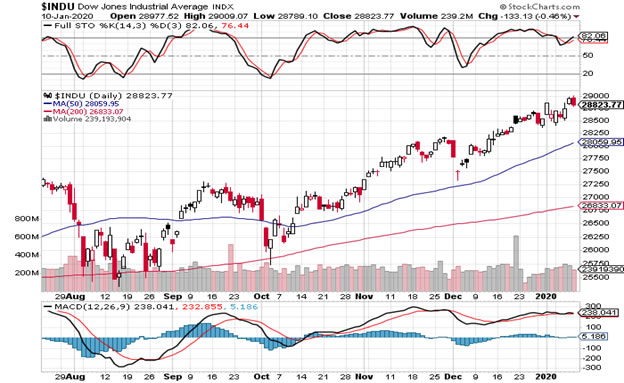
Chart: Dow Transport Average: Daily.
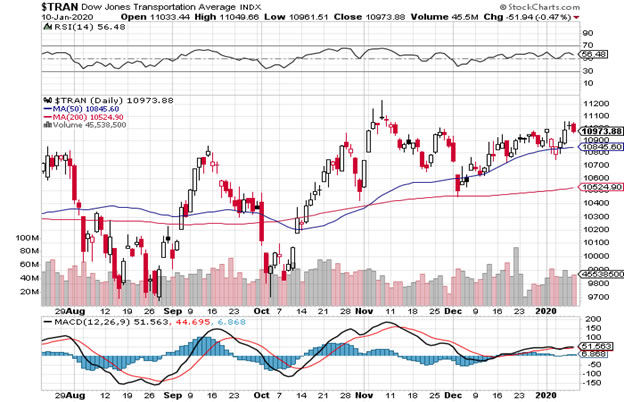
Chart: S & P 500: Daily.
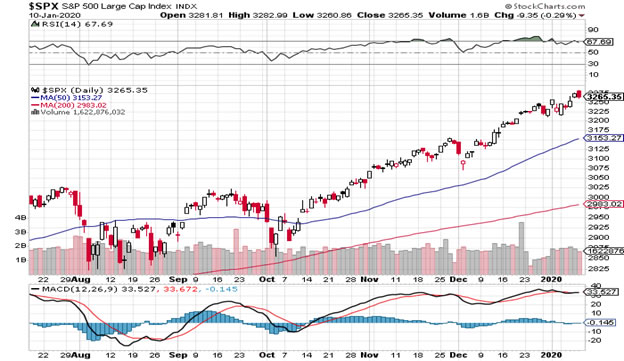
Chart: NASDAQ 100: Daily.
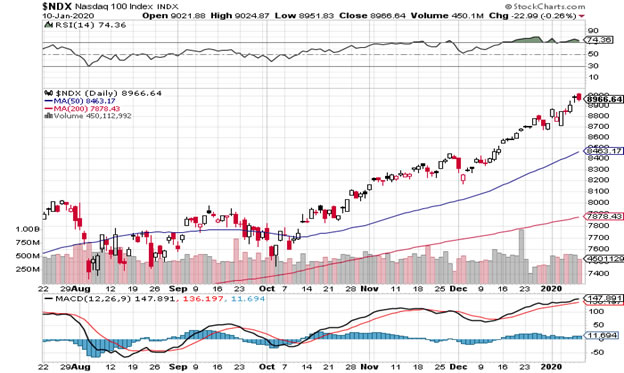
Chart: VIX: Daily.
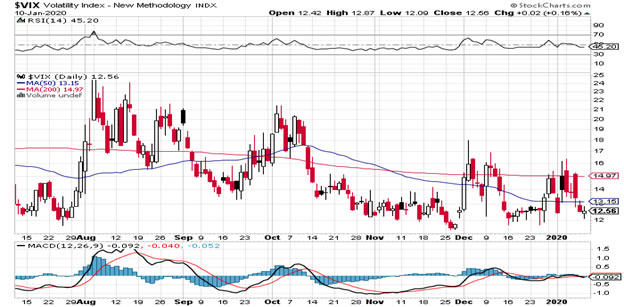
Ref: John Maynard Keynes:
“Economic Possibilities for our Grandchildren”, 1930.
Michael Cooper:
“Lost in Recession, Toll on Underemployed and Underpaid”, 1961.
Stephen Yearwood:
“Smith and Keynes: The Economic Insight They Shared”, 2013.
Daisuke Wakabayashi and Brian X. Chen:
“Apple, Capitalizing on New Tax Law, Plans to Bring Billions in Cash Back to U.S”, Jan 2018.
Charts: Courtesy of StockCharts.Com
Christopher Quiqley
B.Sc., M.M.I.I. Grad., M.A.
http://www.wealthbuilder.ie
Mr. Quigley was born in 1958 in Dublin, Ireland. He holds a Bachelor Degree in Accounting and Management from Trinity College Dublin and is a graduate of the Marketing Institute of Ireland. He commenced investing in the stock market in 1989 in Belmont, California where he lived for 6 years. He has developed the Wealthbuilder investment and trading course over the last two decades as a result of research, study and experience. This system marries fundamental analysis with technical analysis and focuses on momentum, value and pension strategies.
Since 2007 Mr. Quigley has written over 80 articles which have been published on popular web sites based in California, New York, London and Dublin.
Mr. Quigley is now lives in Dublin, Ireland and Tampa Bay, Florida.
© 2019 Copyright Christopher M. Quigley - All Rights Reserved
Disclaimer: The above is a matter of opinion provided for general information purposes only and is not intended as investment advice. Information and analysis above are derived from sources and utilising methods believed to be reliable, but we cannot accept responsibility for any trading losses you may incur as a result of this analysis. Individuals should consult with their personal financial advisors before engaging in any trading activities.
Christopher M. Quigley Archive |
© 2005-2022 http://www.MarketOracle.co.uk - The Market Oracle is a FREE Daily Financial Markets Analysis & Forecasting online publication.



